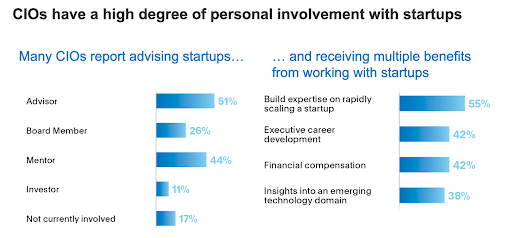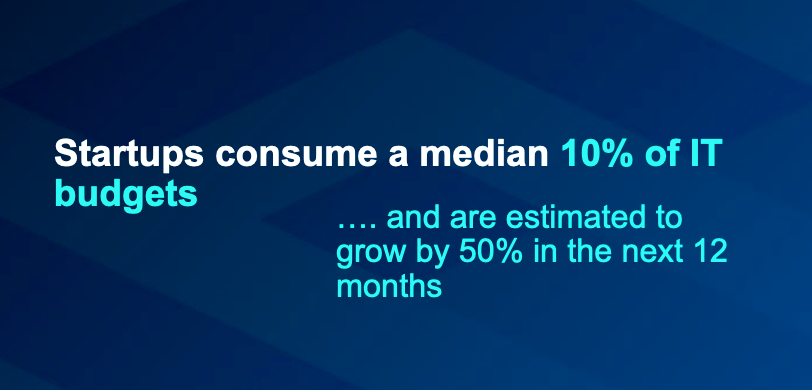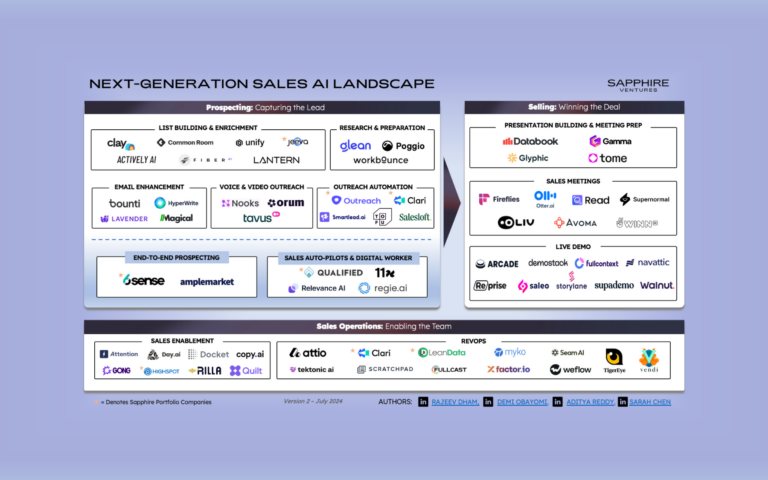Advising a startup can be an incredible experience for any executive, but we found this to be increasingly true for chief information officers (CIO). Today’s CIOs are often tasked with more than being the organization’s go-to for technology solutions, they are at the front-line of understanding industry disruption — and keeping their companies ahead of that disruption.
Today’s CIOs are the change makers, the innovators, and, at times, the designated startup whisperers.
As startups, CIOs can be not only a source of wisdom but also a partner, a coach, and a long-term industry ally.
For CIOs, becoming an advisor is an opportunity to give back. You can work directly with the next generation of startup executives on innovative ideas.
Based on the results from Sapphire’s CIO Innovation Index, we found that more than half of CIOs are currently advising startups, and they have taken on this role for a variety of reasons, including executive career development. Of the CIOs currently involved with startups, we found over 50% of them said they are advising in order to build expertise on rapid scaling a startup so they could learn about agile and innovative processes that could be used inside their organizations.
As Ralph Loura, CIO of Lumentum (and former CIO of Clorox), put it “I have found that serving as an advisor to startups can be a uniquely rewarding experience. The CIO benefits from the opportunity to help shape emerging technology and business model disruptors as they toil to bring early-stage work to the market; and startup leaders benefit from having a seasoned mentor on not only the market and product roadmaps, but on the people and culture aspects of defining a brand and building an organization as well.”

In this post, we’ll discuss how CIOs are embracing the startup mentality in order to develop more efficient go-to-market strategies, and, at the same time, gain access to other leadership opportunities.
1. Startups can often innovate at greater speed
According to CB Insights, 84.9% of corporate strategists surveyed said that innovation is very important. However, 78% of respondents actually focus on incremental changes—and separately, 60% said it takes their company a year or longer to create new products.
Because of their install base, large incumbent companies can be perceived as lagging startups in tech innovation. Implementation of new technologies can be slow due to lengthy reviews and approval, a multitude of stakeholders, and the need to work with the existing tech infrastructure. On the other hand, startups are known to be starting with new technology, often resulting in a more agile, faster time to market for the latest solutions.
CIOs recognize that to stay ahead of the industry disruption, it’s important for large companies to simultaneously manage current operations and future opportunities for growth. In short, CIOs must keep their company’s innovation engine running.
According to Steve Coley, a director emeritus in McKinsey’s Chicago office, maturing companies face several horizons of growth, and they have to remain vigilant about emerging opportunities and pilot programs—all while maintaining day-to-day operations of the core business.
But it’s a difficult balancing act, and that’s one reason we believe we’re seeing more CIOs advising startups: they’re looking for ways to keep their large companies nimble.
Advising a startup allows the CIO to step away from their corner office for a change. They can see what it’s like to move ideas forward without the processes and bureaucracy they’re used to.
Lessons learned from the CIO’s advisory involvement can place them at the forefront of competitive strategy and leading edge technology.
2. Getting insight into new technological domains
Increasing internal efficiency in a large organization is easier said than done. Large budgets often come with lengthy timelines, operational duties, and oversight which can limit the time available for CIOs to discover and test new ideas.
For many CIOs, tapping the startup community can provide opportunities to expand their knowledge. They can partner with external teams and work on breakthrough ideas outside of the existing constraints of their organization.
In this way, startup advising is as much a win for the CIO and their company, as it is to the startup. Think of it as a fast track to innovation. CIOs who advise startups build hands-on experience with the latest technology and can often become their company’s point person for identifying and implementing emerging technologies.
CIOs already recognize the importance startups will play in the future of their enterprise with their spending. Sapphire’s CIO Innovation Index shows that startups today consume a median 10% of IT budgets—and are estimated to grow by 50% over the next 12 months.

This means that large enterprises are seeking innovative solutions from the startup community. Becoming an advisor to one of these startups gives CIOs an inside look at the technology and how start-ups operate — potentially giving CIOs valuable insights on how to best engage startups.
Insights from your direct involvement with startups can help strengthen the CIO’s case for new technologies or partnerships when meeting with the internal CFO, COO, or CEO.
“When you can prove the tech is going to do something amazing for customers or in differentiating your [corporate] performance, you have to tell that story,” said Chris Laping, former CIO and senior vice president of business transformation at Red Robin Gourmet Burgers.
Laping explained in a CIO Magazine interview that he’s always pitching ideas on new technologies and partnerships with the company’s CEO.
3. Advising is a flexible, low-risk way to engage
CIOs are trusted for their deep technological and leadership experience. And given the fast pace of innovation, CIOs are in a unique position to advise startups, not only on the technology, but also how to effectively engage corporate IT decision makers in the sales process.
Advising can be a fulfilling experience—a chance to give back– but it doesn’t have to come with the high risk and time commitment of formally joining a startup.
CIOs can choose to engage with startups in a variety of ways—for example, by becoming an informal advisor or officially joining the board. Generally, advisors and board members both help companies stay ahead of the competition and ultimately grow shareholder value.
However, the main difference between the two roles is that an advisory role is usually informal—often selected by an executive team or board of directors, and CIOs may or may not be financially compensated for their participation.
Independent board directors at startups, on the other hand, are often selected and appointed by the CEO and existing board members (who are typically investors into the startup).

Once elected by shareholders, board members have a fiduciary duty to act in the best interest of the organization. Joining a board brings both a legal and an ethical responsibility to oversee management decisions. And if board members fail to act in good judgment, they can be held liable for the actions of the corporation.
Here are some key distinctions between being an advisor and being a board member:
Advisors
- Informally hand-picked by CEO and management team
- Can serve for as long as needed and are easy to replace
- May be compensated through equity interest in company, or not compensated at all
- No voting rights in the organization, or power make management or product decisions
- No legal duty to prioritize the needs of shareholders
- Not held personally liable for the mistakes or misjudgments in connection to their advisory duties
Board of Directors
- Formally nominated by a nominating committee, ballot, or petition
- Most have term limits, and the removal process depends on company bylaws (impeachment, majority vote, etc.)
- Usually compensated in cash and stock awards
- Voting rights in the organization, with power to remove CEO or make changes in the executive team
- Has a legal duty to place the needs of shareholders before employees, which includes the CEO and management team
- Held personally liable for the mistakes or misjudgments in connection to their board duties
As technology becomes embedded in nearly every facet of a business, seasoned IT executives and CIOs are still missing at the highest levels of corporate leadership—the boardroom. We found that institutional investors are pushing for diversity in many forms, including functional expertise.
However, serving on a board can require a great time commitment (even in a startup). It also comes with legal and corporate governance standards. Conversely, advisory duties are generally more loose, allowing for greater risk-taking and creativity.
Speaking at our 2019 CIO Summit, Patty Morrison, former CIO of Cardinal Health, said, “Being on a board is not a minor commitment. Four directorships can equal a full-time job—and during major events, such as activist bid or merger (which often happens during a 10-year tenure), this can go up considerably.”
4. You can accelerate your career from CIO to innovation catalyst
Software is eating the world. Businesses are getting more and more complicated, and they’re adopting new technologies to meet the needs of savvy consumers.
In fact, more than 70% of the CIOs surveyed in Sapphire’s CIO Innovation Index are investing in emerging technologies, such as artificial intelligence, machine learning, cybersecurity, and data management. And more than 50% are choosing to work with startups over established vendors in those top emerging tech categories.
The CIO is well versed in technology, and they can be a valuable asset during strategic corporate shifts, or even when engaging with startups.
And, over time, CIOs who advise startups can learn skills and gain perspective that can make them great candidates for the top spot.
According to Bask Iyer, CIO and Chief Digital Transformation Officer at VMware, the CIO role has become one of the most complicated in the C-suite, but it also involves preparing IT executives to serve as presidents, general managers, and CEOs.
Becoming an advisor to a startup in a totally different industry is an opportunity to build a diverse resume. Advising startups, CIOs can be on the forefront of change and become technology leaders.
They can also become more exposed to the business decisions of startup companies. They can learn the ins and outs of finance, operations, and product management—all from the perspective of an IT guru.
As Iyer says, “CIOs know how to take a trend, change a culture, change a process, hire the right people, hit the numbers, and achieve delivery—what else could you want from your CEO?”
But accelerating your career takes time. As the CIO, you must be alert for new opportunities but know that building your story and credibility in the industry doesn’t happen overnight.
For example, Wendy M. Pfeiffer, CIO of Nutanix, found that her technological skills were relatable to both her CIO role and her board member role at Qualys, another cloud-computing startup. “Be open to everything,” she says. “Take time to develop and practice your narrative.”

CIOS can also use their time as a startup advisor to remain active during career gaps. Life events, corporate restructuring, or industry shifts shouldn’t deter you from your career goals.
Becoming a startup advisor provides a flexible opportunity to stay ahead of innovation while you transition back to the corporate world—and perhaps open new doors in your leadership journey.
Ready to become a CIO startup advisor?
Startup advisory roles can be a perfect match for CIOs. It provides the opportunity to be directly engaged with more agile organizations that are constantly innovating.
And, in doing so, advisors don’t face the same legal constraints and governance standards that board members experience. They have more freedom to be creative with their startup counterparts, and, contrary to serving on a board, they have more time to balance advisory work with a full-time CIO job.
This is an opportunity to not only stay current with innovations but also exercise your leadership skills to make the industry better as a whole. We’ve seen that collaboration between startups and CIOs from large organizations end up delivering faster technological solutions.
Having startup experience can place the CIO at the center of this industry evolution.



